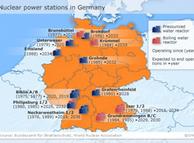Carbon dioxide emissions in Germany may increase by 4 percent annually in response to a moratorium on seven of the country's oldest nuclear power plants, as power generation is shifted from nuclear power, a zero carbon source, to the other carbon-intensive energy sources that currently make up the country's energy supply.
The German government announced today that it will shut down seven of the country's seventeen nuclear power plants for an indefinite period, a decision taken in response to widespread protests and a German public increasingly fearful of nuclear power after a nuclear emergency in Japan. The decision places a moratorium on a law that would extend the lifespan of these plants, and is uncharacteristic of Angela Merkel, whose government previously overturned its predecessor's decision to phase nuclear out of Germany's energy supply.
The seven plants, each built before 1980, represent 30% of Germany's nuclear electricity generation and 24% of its gross installed nuclear capacity. Shutting down these plants, or even just placing an indefinite hold on their operation, would be a major loss of zero-emissions generation capacity for Germany. The country currently relies on nuclear power from its seventeen nuclear power plants for about a quarter of its electricity supply.
16 March 2011
Pick Your Poison
From The Breakthrough Institute blog:
